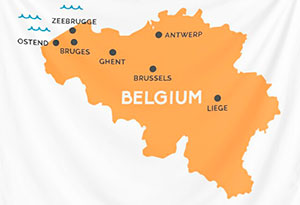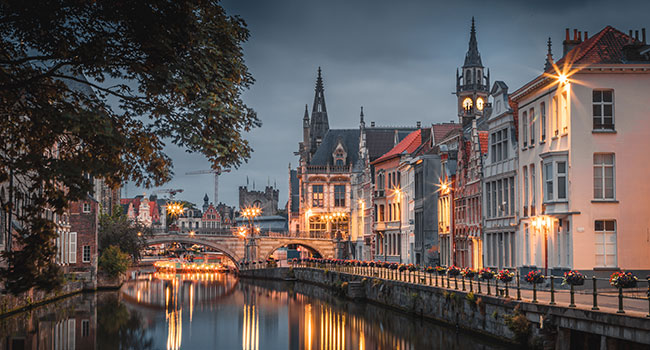 Ghent is a friendly university town that is full of ancient buildings and history. If Bruges is a city filled with tourists looking for a time warp, Ghent is a city full of students and locals just living life. Like Bruges, it started as a port but, unlike Bruges, it still is an important port. It’s a city of flowers with a flourishing flower export trade.
Ghent is a friendly university town that is full of ancient buildings and history. If Bruges is a city filled with tourists looking for a time warp, Ghent is a city full of students and locals just living life. Like Bruges, it started as a port but, unlike Bruges, it still is an important port. It’s a city of flowers with a flourishing flower export trade.
It has museums and ancient architecture, but it’s a modern city. True, the city centre is a pedestrian area that is like a museum to early Flemish architecture and a testament to the city’s medieval might, but it’s surrounded by a real-life city. The tourist brochures say it has more historic sites than Antwerp and is more down-to-earth “real” than Bruges. While I love Bruges, I think I agree with them.
It’s not high on a lot of tourists’ lists, but it deserves to be, though I admit the only reason I went to Ghent in the first place was because we had hosted a student from the university one summer.
As a tourist, it’s the old city centre you want to visit. You’ll find a wealth of history to explore within the outline of the old city walls. You’ll see impressive Gothic sites, such as dramatic St. Bavos’s Cathedral and the Castle of the Counts. The city’s medieval core is cradled within a loop of the River Leie, which surrounds the old town like a moat.
 It’s a big city, Belgium’s fourth largest, but you’ll only be dealing with the centre. The historical centre is divided into “areas.” To find your way around on the tourists maps you need to become familiar with these areas but don’t worry, there’s no quiz and it’s not hard. The historical city centre is in the area called Toren-site. To the north is Patershol, which contains a lot of the best restaurants. To the south is the Kunstenkwartier, where most of the universities’ 50,000 students congregate.
It’s a big city, Belgium’s fourth largest, but you’ll only be dealing with the centre. The historical centre is divided into “areas.” To find your way around on the tourists maps you need to become familiar with these areas but don’t worry, there’s no quiz and it’s not hard. The historical city centre is in the area called Toren-site. To the north is Patershol, which contains a lot of the best restaurants. To the south is the Kunstenkwartier, where most of the universities’ 50,000 students congregate.
There are numerous waterways passing through the city centre. The city started as a settlement on the Scheldt and Lys (Leie) Rivers. But you don’t need to know all the rivers and canals: just know that all this water makes the city pretty.
Castle of the Counts is an imposing fortress type castle in the heart of the city: The Gravensteen area or “Gravensteen-site”. This imposing castle was re-built in 1180 (and then restored in the 19th century). It overlooks the city from its battlements high up on the keep and you get a great panoramic view of the city from the tower. There is an authentic medieval district in the shadow of the Castle which is still partially surrounded by a medieval moat.
The area called Toren-site is the historical heart of the city. This is where you’ll find Saint Bavo Cathedral with the Ghent Altarpiece – The Mystic Lamb by Hubert and Jan Van Eyck. This famous multi-section altarpiece was completed in 1432, and is worth a look whether you’re an art lover or not.
Walk over St. Michael’s Bridge, also in the heart of town, in the Graslei-site. The Graslei is one of the most scenic places in Ghent’s old city centre. From the bridge, you’ll have a wonderful view of the skyline of Ghent with the three impressive towers of St Nicholas’ Church, the Belfry with its bell tower, and Saint Bavo Cathedral.
If all of these areas make the city sound spread out, it’s not; at least not the historical centre. You won’t get lost in Ghent: pedestrian signposts are everywhere. So stop and explore this historic Belgium city; you’ll be glad you did.
BECOME A TRAVEL LIKE THIS CONTRIBUTOR
Contact us for details.
The views, opinions and positions expressed by columnists and contributors are the author’s alone. They do not inherently or expressly reflect the views, opinions and/or positions of our publication.


